Related Research Articles

Fascism is a far-right, authoritarian, ultranationalist political ideology and movement, characterized by a dictatorial leader, centralized autocracy, militarism, forcible suppression of opposition, belief in a natural social hierarchy, subordination of individual interests for the perceived good of the nation or race, and strong regimentation of society and the economy.
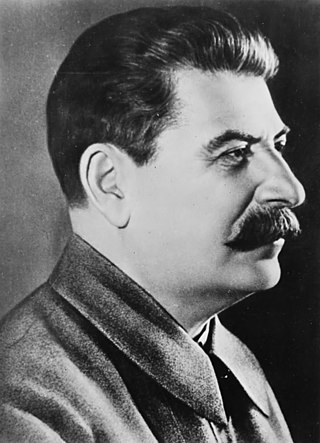
Totalitarianism is a form of government and a political system that prohibits all opposition parties, outlaws individual and group opposition to the state and its claims, and exercises an extremely high if not complete degree of control and regulation over public and private life. It is regarded as the most extreme and complete form of authoritarianism. In totalitarian states, political power is often held by autocrats, such as dictators and absolute monarchs, who employ all-encompassing campaigns in which propaganda is broadcast by state-controlled mass media in order to control the citizenry.
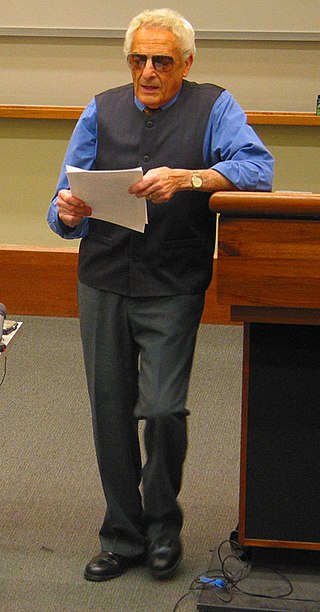
Anthony James Gregor was an American political scientist and eugenicist and professor of political science at the University of California, Berkeley, known for his research on fascism, Marxism, and national security.

The Vlaamsch Nationaal Verbond, widely known by its acronym VNV, was a Flemish nationalist political party active in Belgium between 1933 and 1945. It became the leading force of political collaboration in Flanders during the German occupation of Belgium in World War II. Authoritarian by inclination, the party advocated the creation of a "Greater Netherlands" (Dietsland) combining Flanders and the Netherlands.
Timothy Wright Mason was an English Marxist historian of Nazi Germany. He was one of the founders of the History Workshop Journal and specialised in the social history of the Third Reich. He argued for the "primacy of politics," i.e., that the Nazi government was "increasingly independent of the influence of the [German] economic ruling classes," and believed the Second World War had been triggered by an economic crisis inside Germany.
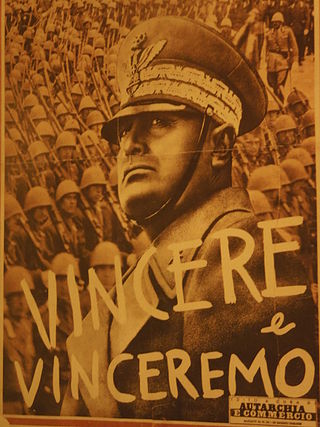
The history of fascist ideology is long and it draws on many sources. Fascists took inspiration from sources as ancient as the Spartans for their focus on racial purity and their emphasis on rule by an elite minority. Fascism has also been connected to the ideals of Plato, though there are key differences between the two. Fascism styled itself as the ideological successor to Rome, particularly the Roman Empire. From the same era, Georg Wilhelm Friedrich Hegel's view on the absolute authority of the state also strongly influenced fascist thinking. The French Revolution was a major influence insofar as the Nazis saw themselves as fighting back against many of the ideas which it brought to prominence, especially liberalism, liberal democracy and racial equality, whereas on the other hand, fascism drew heavily on the revolutionary ideal of nationalism. The prejudice of a "high and noble" Aryan culture as opposed to a "parasitic" Semitic culture was core to Nazi racial views, while other early forms of fascism concerned themselves with non-racialized conceptions of the nation.

The "Manifesto of Race", otherwise referred to as the Charter of Race or the Racial Manifesto, was a manifesto which was promulgated by the Council of Ministers on the 14th of July 1938, its promulgation was followed by the enactment, in October 1938, of the Racial Laws in Fascist Italy (1922–1943) and the Italian colonial empire (1923–1947).
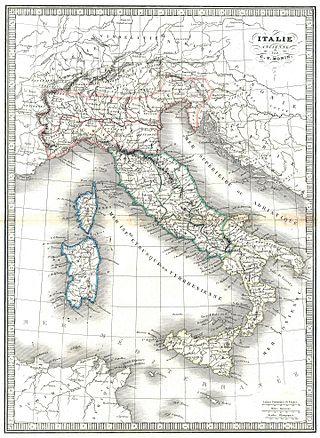
Italian fascism, also known as classical fascism or simply fascism, is the original fascist ideology as developed in Italy by Giovanni Gentile and Benito Mussolini. The ideology is associated with a series of two political parties led by Benito Mussolini: the National Fascist Party (PNF), which ruled the Kingdom of Italy from 1922 until 1943, and the Republican Fascist Party (PFR) that ruled the Italian Social Republic from 1943 to 1945. Italian fascism is also associated with the post-war Italian Social Movement (MSI) and subsequent Italian neo-fascist movements.
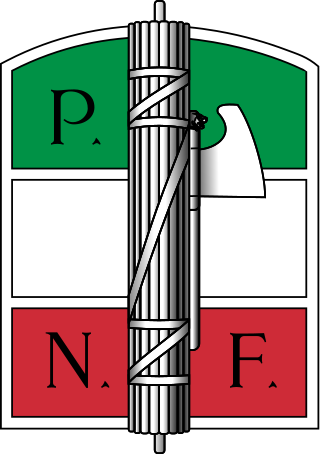
The National Fascist Party was a political party in Italy, created by Benito Mussolini as the political expression of Italian fascism and as a reorganisation of the previous Italian Fasces of Combat. The party ruled the Kingdom of Italy from 1922 when Fascists took power with the March on Rome until the fall of the Fascist regime in 1943, when Mussolini was deposed by the Grand Council of Fascism. It was succeeded, in the territories under the control of the Italian Social Republic, by the Republican Fascist Party, ultimately dissolved at the end of World War II.

Romanian nationalism is the nationalism which asserts that Romanians are a nation and promotes the cultural unity of Romanians. Its extremist variation is the Romanian ultranationalism.

The National Radical Camp refers to at least three groups that are fascist, far-right, and ultranationalist Polish organisations with doctrines stemming from pre-World War II nationalist ideology.

António Costa Pinto is a research professor at the Institute of Social Sciences, University of Lisbon, and Professor of Politics and Contemporary European History at ISCTE – Lisbon University Institute, Portugal.
Eliminationist antisemitism is an extreme form of antisemitism which seeks to completely purge Jews and Judaism from society, either through genocide or through other means. Eliminationist antisemitism evolved from older concepts of religious antisemitism. The concept was developed by Daniel Goldhagen in his book Hitler's Willing Executioners to describe German antisemitism in the twentieth century, but has since been adapted and used to describe antisemitism in other societies and eras.
A right-wing dictatorship, sometimes also referred to as a rightist dictatorship or right-wing authoritarianism, is an authoritarian or sometimes totalitarian regime following right-wing policies. Right-wing dictatorships are typically characterized by appeals to traditionalism, the protection of law and order and often the advocacy of nationalism, and justify their rise to power based on a need to uphold a conservative status quo, and also in opposition to communism. Notable examples of right-wing dictatorships include Nazi Germany, Fascist Italy, Estado Novo, Francoist Spain, Russia under Vladimir Putin and a number of military dictatorships that ruled various Latin American countries during the Cold War.

Some authors and historians have carried out comparisons of Nazism and Stalinism. They have considered the similarities and differences between the two ideologies and political systems, the relationship between the two regimes, and why both came to prominence simultaneously. During the 20th century, the comparison of Nazism and Stalinism was made on totalitarianism, ideology, and personality cult. Both regimes were seen in contrast to the liberal democratic Western world, emphasizing the similarities between the two.

Anti-fascism is a political movement in opposition to fascist ideologies, groups and individuals. Beginning in European countries in the 1920s, it was at its most significant shortly before and during World War II, where the Axis powers were opposed by many countries forming the Allies of World War II and dozens of resistance movements worldwide. Anti-fascism has been an element of movements across the political spectrum and holding many different political positions such as anarchism, communism, pacifism, republicanism, social democracy, socialism and syndicalism as well as centrist, conservative, liberal and nationalist viewpoints.

Roger Eatwell is a British academic currently an Emeritus Professor of Politics at the University of Bath.

Wehrmacht Propaganda Troops was a branch of service of the Wehrmacht and the Waffen-SS of Nazi Germany during World War II. Subordinated to the High Command of the Wehrmacht, its function was to produce and disseminate propaganda materials aimed at the German troops and the population.

The Kingdom of Italy was governed by the National Fascist Party from 1922 to 1943 with Benito Mussolini as prime minister. The Italian Fascists imposed totalitarian rule and crushed political and intellectual opposition, while promoting economic modernization, traditional social values and a rapprochement with the Roman Catholic Church.

Nástup was a semimonthly Slovak periodical, published between 1933 and 1940, that advocated Slovak autonomy, ethnonationalism, and antisemitism. Founded by Ferdinand Ďurčanský and his brother Ján, the magazine was oriented at younger Slovak Catholics, especially university students. Its readers, the most radical wing of the Slovak People's Party, were called "Nástupists" or "Nástup faction"; many of them had been previously affiliated with Rodobrana paramilitary and later with the Hlinka Guard paramilitary.
References
- Baranowski, Shelley O. (2009). "Fascism, Totalitarianism, and Beyond: Recent Perspectives on the Twentieth-Century Dictatorships". H-Net . Retrieved December 22, 2016.
- "Profile". Keele University . 2016. Retrieved December 22, 2016.
- Rutherford, Jeff (2015). "Review: Germany and the Second World War, volume IX/II: German Wartime Society 1939–1945: Exploitation, Interpretations, Exclusion". German History . Oxford University Press. 33 (1): 162–164. doi:10.1093/gerhis/ghu098.